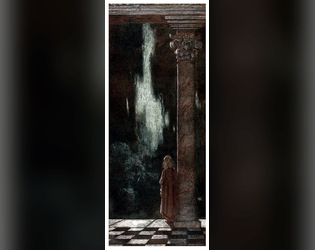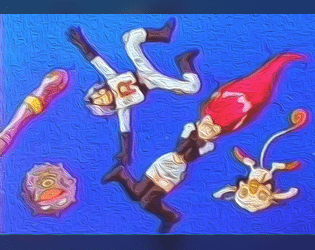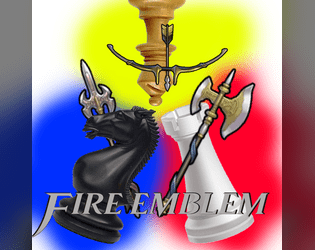Coming back after having run a two and a half year campaign to say: this is the good stuff. We told an epic story about changing the world for the better and got to be huge history nerds in the process.
MonstrousMouse
Creator of
Recent community posts
You'd think that creating an elaborate, twisting mystery/courtroom plot takes a lot of planning. Apparently not--my group played this and the story was incredible, even though we were all making it up on the spot. It really did feel like something out of Phoenix Wright, a complex web unfolding piece by piece.
I played this game years ago, but I still think about it all the time, and eventually I decided to come back and comment. I haven't played anything else since that combines such beautiful, mind-bending art and worldbuilding with such an intensely personal story. I could say a lot more, but I'll stick to just: thank you for making this game, and for holding nothing back.
Tired: The Yakuza games are about crime drama.
Wired: The Yakuza games are about getting pulled into dozens of side-stories about helping out regular people.
Inspired: What if we did both, but made the crime drama explicitly about fighting for the folks from the side-stories, rather than defending the honor of the Tojo Clan or whatever?
Needless to say, this is my new favorite take on the series! I love tabletop adaptations of video games that, rather than trying to blindly replicate the original, really get at why the games emotionally resonate with us.
I've been waiting for a game like this since I first read a Let's Play of Trails in the Sky! The best PbtA games are ones that go all-in on emulating a specific genre, and Shepherds uses the framework to make a game that perfectly captures the Trails experience, whether that's having a separate advancement track for growing into a mentor, "defeating" most recurring villains by eventually talking them down, or earning a title that will be used every time you walk into a room. It's also the first PbtA game I've seen that doesn't use playbooks at all, giving everyone the same moves and using character archetypes purely for storytelling purposes, which is really interesting.
I love this game's main mechanic! It's simple and elegant, while still allowing characters to specialize in a way that sets them apart from each other. Setting the default DC low helps make players feel powerful when they use their characters' specialties, while still giving an untrained character a decent chance at success. It seems great for introducing new players to roleplaying, too.
If I had any complaints, it would be the use of HP for monsters. Some action types seem like they would deplete HP (Fight), and some don't (the examples for Sneaky and Knowledge), and the book doesn't give the GM any guidelines for what to do if a move doesn't deplete HP. I can imagine an alternative system with something like "this monster takes 5 successful rolls to defeat" instead.
Fantastic solo system! I've seen a lot of solo games on Itch.io, but what makes this one and Flee the Flood unique is how open-ended they are - because they don't rely on specific journaling prompts for each card, the rules can be adapted to any story with rising stakes, as long as you come up with new things for each suit and each face to refer to.
One thing I'm curious about: is there any reason the Threat is laid out in a specific way? From what I understand, you lose when you have a full set of 2 through 10, regardless of the shape they're in.
For potential readers: This book is about anxiety, feeling comfortable in your own body, and having people in your life who love and support you for who you are. Despite the maid outfits, it is NOT about master/servant relationships, or the thrill of submission, or power dynamics at all—the book could have just as easily focused on any other women’s work uniform.
Personally, I’m a little disappointed that that angle wasn’t there, but that’s my fault for bringing the wrong assumptions to the book. It was a fun read, and I loved the ending.




